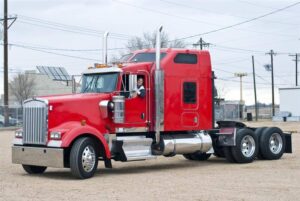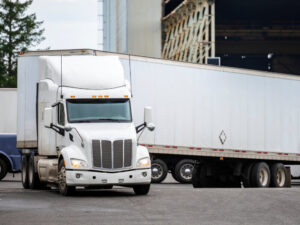
What is bobtailing? “Bobtailing” is the term for driving a semi-truck without an attached trailer. Trailers make semis more stable by balancing out the cab and putting more weight over the truck’s rear axles. As a result, bobtailing can be extremely dangerous for other drivers.
When bobtailing causes truck accidents, the effects can be devastating, potentially causing severe injuries and extensive property damage.
Contents
- 1 How Is ’Deadheading’ Different from ’Bobtailing’?
- 2 Does Bobtailing Change the Way a Semi-Truck Handles?
- 3 Why Must a Truck Driver Be Extra Careful When Bobtailing?
- 4 Who Can Be Held Liable for a Bobtail Truck Accident?
- 5 What Should You Do If You’re in a Florida Accident with a Bobtailing Truck?
- 6 What Are My Legal Options If I Have Been Involved in a Bobtailing Trucking Accident in Florida?
- 7 Contact a Florida Truck Accident Lawyer
How Is ’Deadheading’ Different from ’Bobtailing’?
Bobtailing and dead-heading both involve semi-trucks that aren’t carrying a load, but there’s a key difference between the two. Bobtailing is when a semi-truck is driven without a trailer attached, whereas deadheading is when the truck has a trailer but it’s empty.
Both situations can increase the risk of a crash. When a truck is bobtailing, most of the weight is concentrated over the front wheels instead of being distributed evenly between the front and rear axles. This makes braking and turning more difficult, especially in wet or slippery conditions. Bobtail trucks also tend to be more sensitive to sudden steering inputs and are harder to control during emergency maneuvers.
Deadheading also makes truck accidents more likely because an empty trailer doesn’t provide the same grip or balance as a loaded one. It’s more likely to bounce, sway, or get pushed around by wind or passing vehicles. Both practices reduce traction, stability, and braking power, which makes those trucks more accident-prone than fully loaded rigs.
Does Bobtailing Change the Way a Semi-Truck Handles?
Yes, bobtailing significantly changes how a semi-truck handles. Without a trailer, most of the truck’s weight sits over its front wheels, which reduces traction on the rear axle. This imbalance makes braking more difficult and turning less predictable, especially on slick roads. Therefore, bobtail trucks are more prone to skidding, jackknifing, and losing control during sudden maneuvers.
Why Must a Truck Driver Be Extra Careful When Bobtailing?
Even though bobtailing might seem easier due to the lighter load, it actually requires more caution and precision. Without the added weight of a trailer to balance the vehicle, the rear wheels have less traction, making it easier to lose control – especially when braking suddenly or navigating curves.
Bobtail trucks are also more likely to skid or jackknife in wet or slippery conditions. The reduced stability means drivers must leave extra space between vehicles, slow down for turns, and avoid aggressive braking.
Who Can Be Held Liable for a Bobtail Truck Accident?
One key job of a truck accident attorney is to identify who may be liable for a crash so you can pursue fair compensation from them. Depending on the cause of a bobtail truck accident, the potentially liable parties could include:
- The Truck Driver – A truck driver may be liable for a collision if they were speeding, distracted, fatigued, or failed to adjust their driving to account for the unique handling characteristics of a bobtail truck. Failing to brake properly, making unsafe lane changes, or ignoring weather conditions are typical examples of driver negligence in bobtail crashes.
- The Trucking Company – A trucking company could be responsible for a bobtail crash if it pressured the driver to operate under unsafe conditions, failed to properly train the driver on bobtail handling, or didn’t maintain the truck properly. Trucking companies are also often liable for accidents resulting from the actions of their drivers.
- A Third-Party Truck Owner – If a third party owns the truck and failed to maintain it properly – such as by ignoring brake issues, steering defects, or tire problems – they could be liable for any resulting crash.
- A Maintenance Provider – If a repair shop or service provider performed faulty maintenance or skipped essential repairs that contributed to the accident, they could share responsibility for the collision.
- Other Drivers – In some crashes involving large trucks, another motorist may have caused or contributed to the crash by cutting off the truck, stopping suddenly, or acting recklessly on the road.
What Should You Do If You’re in a Florida Accident with a Bobtailing Truck?
The first steps to take after a bobtail truck accident in Florida are to call 911 and seek medical attention. Once you’ve done that, follow these steps in the coming weeks and months to protect your legal rights:
- Attend all follow-up appointments, take your prescribed medications, and complete physical therapy or rehabilitation as recommended by your doctor.
- Keep a journal of your symptoms, pain levels, and how your injuries affect your daily life. This evidence can help you make a more persuasive case for compensation for your non-economic losses.
- Hold onto medical bills, pharmacy receipts, proof of lost wages, and any out-of-pocket expenses related to the crash. You’ll want these documents to prove your financial losses from the accident.
- Don’t give a recorded statement without first seeking legal advice, as you might say something that hurts your case. Similarly, consult a lawyer before accepting any settlement so they can evaluate the offer.
- Don’t post about the accident on social media, as insurers can use your posts against you, even if they seem harmless.
- Consult an experienced truck accident attorney. They can help protect your rights, investigate the crash, and fight for full compensation on your behalf.

What Are My Legal Options If I Have Been Involved in a Bobtailing Trucking Accident in Florida?
All Florida auto insurance policies must include no-fault Personal Injury Protection (PIP) coverage. You can use this coverage to pay for your immediate medical treatment and other needs after a bobtail crash.
However, your PIP coverage may not be enough to cover all your losses. If you can prove you sustained severe injuries, you can step outside the no-fault system and pursue legal action against whoever caused the crash. However, you must prove that the truck driver or someone else caused the collision to win your case, so working with an experienced attorney is vital for your truck accident claim.
Contact a Florida Truck Accident Lawyer
With over 50 years of combined experience, the Tampa truck accident attorneys at Zervos & Calta, PLLC, can provide the comprehensive legal support you need to recover fair compensation. Insurers and satisfied clients alike know us for our tough-as-nails advocacy in truck accident cases, and we’ll use all the tools in our legal arsenal to enforce your rights and pursue the results you deserve. Call now or complete our contact form for a free consultation about your potential truck accident lawsuit.


